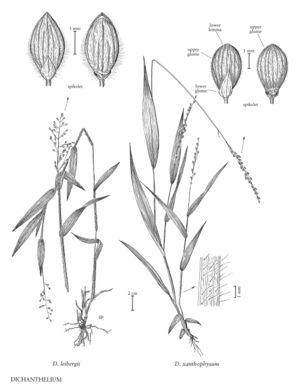Difference between revisions of "Dichanthelium leibergii"
FNA>Volume Importer |
FNA>Volume Importer |
||
| Line 20: | Line 20: | ||
-->{{Treatment/Body | -->{{Treatment/Body | ||
|distribution=Minn.;N.Y.;Mo.;Alta.;Man.;Ont.;Sask.;Mich.;Wis.;Kans.;N.Dak.;Nebr.;S.Dak.;Pa.;Ill.;Ind.;Iowa;Ohio | |distribution=Minn.;N.Y.;Mo.;Alta.;Man.;Ont.;Sask.;Mich.;Wis.;Kans.;N.Dak.;Nebr.;S.Dak.;Pa.;Ill.;Ind.;Iowa;Ohio | ||
| − | |discussion=<p>Dichanthelium leibergii grows primarily on prairie relics, but is occasionally found in sandy woodlands. It is restricted to the Flora region. The primary panicles are produced from mid-May through July, the secondary panicles from late June to September. Sterile putative hybrids with D. acuminatum and D. xantho-physum are occasionally found.</p> | + | |discussion=<p><i>Dichanthelium leibergii</i> grows primarily on prairie relics, but is occasionally found in sandy woodlands. It is restricted to the Flora region. The primary panicles are produced from mid-May through July, the secondary panicles from late June to September. Sterile putative hybrids with <i>D. acuminatum</i> and D. xantho-physum are occasionally found.</p> |
|tables= | |tables= | ||
|references= | |references= | ||
| Line 41: | Line 41: | ||
|publication year= | |publication year= | ||
|special status= | |special status= | ||
| − | |source xml=https://jpend@bitbucket.org/aafc-mbb/fna-data-curation.git/src/ | + | |source xml=https://jpend@bitbucket.org/aafc-mbb/fna-data-curation.git/src/8f726806613d60c220dc4493de13607dd3150896/coarse_grained_fna_xml/V25/V25_1143.xml |
|subfamily=Poaceae subfam. Panicoideae | |subfamily=Poaceae subfam. Panicoideae | ||
|tribe=Poaceae tribe Paniceae | |tribe=Poaceae tribe Paniceae | ||
Revision as of 17:28, 18 September 2019
Plants cespitose, with knotty rhizomes no more than 2 mm thick. Basal rosettes well-differentiated; blades few, small, ovate to lanceolate. Culms 24-80 cm, glabrous or puberulent; nodes sparsely, spreading-pilose; internodes mostly elongated, glabrous or puberulent; fall phase with a few suberect branches from the lower and midculm nodes, blades slightly reduced, secondary panicles partially exserted. Cauline leaves 3-4; sheaths not overlapping, with ascending papillose-based hairs; ligules 0.3-0.5 mm, membranous, ciliate, cilia longer than the membranous portion; blades 5-15 cm long, 7-13 mm wide, ascending to erect, sparsely to densely pubescent with papillose-based hairs, with 9-11 prominent major veins and 25-50 minor veins, bases truncate to cordate, margins with papillose-based cilia. Panicles 6-10 cm long, 3-5 cm wide, their length usually less than twice their width, eventually well-exserted, with 20-40 spikelets; branches spreading to ascending. Spikelets 3.3-3.8 mm long, 1.6-2 mm wide, ellipsoid-obovoid, turgid, pubescent, hairs papillose-based, apices rounded. Lower glumes about 1.8 mm, narrowly triangular; lower florets staminate; upper florets mucronate. 2n = 18.
Distribution
Minn., N.Y., Mo., Alta., Man., Ont., Sask., Mich., Wis., Kans., N.Dak., Nebr., S.Dak., Pa., Ill., Ind., Iowa, Ohio
Discussion
Dichanthelium leibergii grows primarily on prairie relics, but is occasionally found in sandy woodlands. It is restricted to the Flora region. The primary panicles are produced from mid-May through July, the secondary panicles from late June to September. Sterile putative hybrids with D. acuminatum and D. xantho-physum are occasionally found.
Selected References
None.
